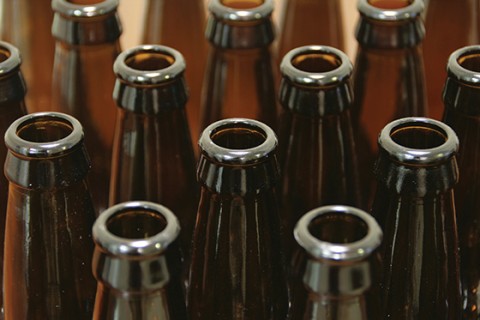Faith, hops, and love: The homebrew movement goes to church

Geoff Losee’s homemade beer bears a label with an icon of his Episcopal parish’s patron saint, Paul the apostle, encircled with “God’s Peace, Happy Yeast.” His congregation was one of several that competed in the What Would Jesus Brew? contest in Wilmington, North Carolina, over the past two years.
“The whiskeypalians went 1-2,” Losee said after his smoked barley porter, Thurifer’s Choice, won second place at the contest this past fall.
Jeffrey Hughes, another member of the Brew Unto Others team from St. Paul’s Episcopal Church in Wilmington, won first place for his Dubbel Indulgences, a classic Belgian brewed with black plums, granola, and maple syrup to enhance the smooth, robust flavors. “This is what the monks made,” Losee said of the concoction.
Read our latest issue or browse back issues.
While medieval monastics did not invent beer, they did revolutionize the brewing process with refined recipes, sanitary strictness, and the introduction of hops as a preservative, which would become a key flavoring. The monks could apply the Benedictine rule of work to God’s agricultural bounty and produce something of value for the people around them.
The work of monastic brewers inspired the third-place winner, Rob Smeaton, who organized the hosting team at St. Therese’s, a Roman Catholic church in Wrightsville Beach. He started brewing after visiting Europe as a student.
“I was drinking Bud Light in college,” he said. “Because beer and wine are cheaper in Europe, I was drinking really good stuff.”
The rise of microbrewing in the 21st century has renewed interest among Christians in the church-related brewing heritage. Beer & Hymns and Theology on Tap events are bubbling up across the United States, bringing worship and Bible study into local taverns. In local parishes homebrew clubs have formed for fun and fellowship. They’re also extending the monks’ tradition of hospitality by offering a meeting place for non-Christians.
“It’s a way to introduce Christ or Christian community without the churchiness getting in the way,” said Dena Bearl, rector of St. Paul’s.
Despite Losee’s joke about “whiskeypalians,” brew club participants recognize the hazards of promoting alcohol while simultaneously ministering to alcoholics, as well as to youth who might be experimenting with underage drinking.
Bearl noted that, like most pastors, she ministers to people in recovery from alcoholism. St. Paul’s is starting an Alcoholics Anonymous meeting in its building. “I don’t know any alcoholics that have said nobody should ever drink and alcohol should never be present at church,” Bearl said. “I don’t sense from them any discomfort with moderate and appropriate use of alcohol.”
She insists that church events that include alcohol also offer nonalcoholic drinks—ones with as much flavor as the beer or wine that might be available—and she encourages parishioners to do the same when hosting one another in their homes.
Working out of the St. Paul’s congregation, Hughes helped to organize the area’s first congregation-based brewing competition in 2012. One of his aims is to change the perception that people have of Christians as judgmental and unable to have any fun—a perception he encounters a lot among the people he works with in Wilmington’s “Hollywood East” film industry, which produces hit films such as Iron Man 3.
Instead of rejecting beer altogether because of alcohol’s potential to create dependency, Hughes and others see gatherings such as What Would Jesus Brew? as celebrating the earth’s abundance and encouraging creativity.
“This is not an activity that encourages the abuse of alcohol, but one that is about creating something you’d be proud to say you made,” said J. D. Brown, who started homebrewing classes as part of a young men’s ministry at Holy Trinity Episcopal Church in Garland, Texas. “The friendships that result in the process strengthen the community—which is the body of Christ.” Brown said he has not seen anyone overindulge at a church event.
Each fall Holy Trinity’s men’s group, a chapter of the international Brotherhood of St. Andrew, hosts an Oktoberfest to raise money for youth mission trips. An annual homebrew contest happens alongside a pig roast, face painting, a children’s bounce house, and a cake walk.
“It is a family event,” Brown said. “Members of the congregation invite friends and family to join us, which actually is in keeping with the invitational tradition of St. Andrew, who invited his brother Peter to come and meet our Lord. . . . We card everyone and only pour out a taste in a plastic punch glass so that we meter consumption.
“It is a very nonthreatening way to get someone into the building,” he said. “Conversations are started, relationships built, and pretty soon you earn the right to have a deeper conversation with those who attend.”
Brewing and sharing beer as a form of fellowship can also be a way to spark conversations about moderation. Kevin Hay, a Presbyterian campus minister at the University of North Carolina at Wilmington, does not drink his homebrews with his students, but he does not hide his hobby, either.
“I try to encourage responsibility by being open to talking about alcohol rather than treating it like a forbidden fruit,” he said.
Anderson Campbell, who works with online education at George Fox Evangelical Seminary in Portland, Oregon, is writing a book about brewing and spirituality. He sees beer as a metaphor for a common life that honors each individual. The uniqueness of each ingredient and its source—such as the specific mineral makeup of regional water supplies—influences the end product, just as individual stories change the identity of a congregation.
“I can honor the story of the water and choose to brew ales that are well suited to the water profile for my region, or I can chemically alter the water by adding things to it or removing things from it,” Campbell wrote on the Patheos blog.
Last summer, the 35th annual National Homebrewers Conference included a service at Philadelphia’s First Unitarian Church and celebrated beer as promoting “conviviality and equality among all people.”
Church beer is also big business. Since 2006, Benedictine Monastery of Christ in the Desert in New Mexico has been operating the Abbey Beverage Company, brewing Belgian and German-style ales under the Monks Ale label. The brothers grow their own hops on site for their Kolsch, American Pale, and Dubbel and Tripel Reserve ales. The monks made almost 15,000 cases in 2012—worth hundreds of thousands of dollars in revenue—with a capacity to brew twice that much. In January, St. Joseph’s Abbey in Spencer, Massachusetts, the first certified Trappist brewery outside of Europe, began distributing Spencer Trappist Ale locally, with plans to make it available nationally.
Bigger breweries are also capitalizing on the abbey craze. Sierra Nevada brewery in California collaborates with the brothers at the nearby New Clairvaux monastery to make its Belgian ale series, Ovila, named for Spain’s Cistercian abbey Santa Maria de Ovila.
Jeff Guidos is part of a renaissance of microbrewing centered on St. Vincent Archabbey in Latrobe, Pennsylvania. Rolling Rock was brewed in Latrobe until 2006, when Anheuser-Busch bought the brand and moved production to New Jersey. A Catholic who studied chemistry at St. Vincent College, Guidos said the Benedictine brewers who settled in the area knew what they were doing. “They picked Latrobe because of the land and the water to grow their barley,” he said.
At his All Saints Brewing Company in nearby Greensburg, Guidos makes beers such as the Heavy Weizen, a dark German wheat or Weizenbock-style ale.
“Bockbiers were brewed by monks for fortification during times of fasting,” according to the All Saints website.
Sean Wilson, a Christian and a graduate of Wheaton College in Illinois, has built Fullsteam Brewery in Durham, North Carolina, into one of the city’s central social spaces. He’s not overtly Christian on his mission, but he says, “I do look at what we do with a quiet mission: to bring people together in the spirit of community and fellowship.”





